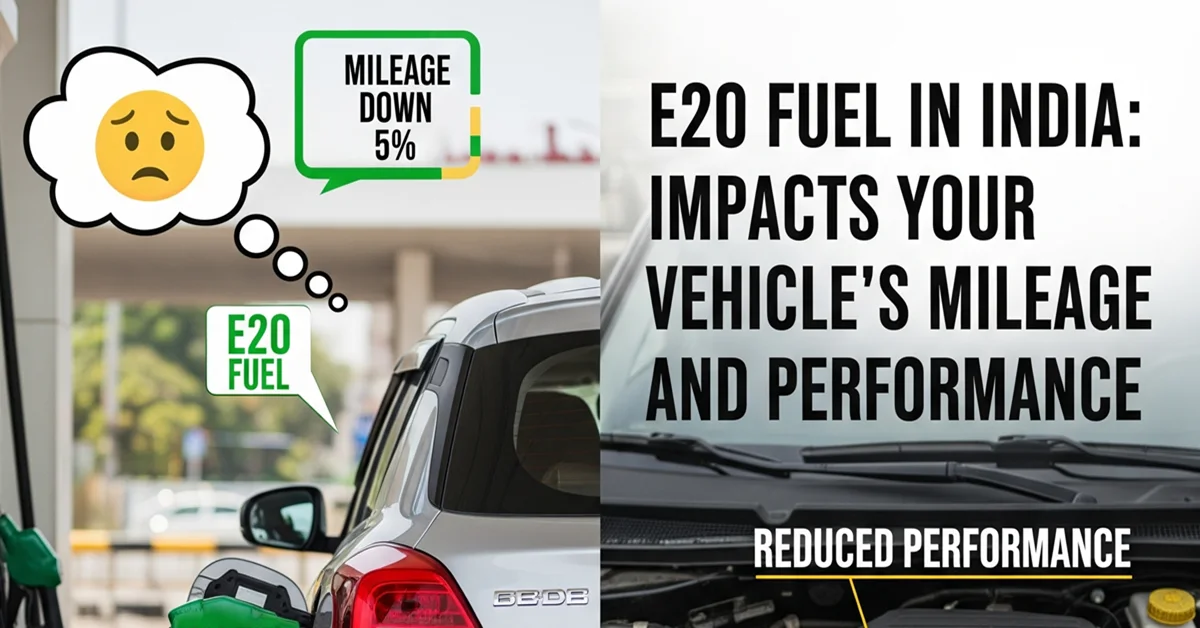India is steadily moving towards cleaner and more sustainable fuels. One major step in this journey is the rollout of E20 petrol—a blend of 20% ethanol and 80% petrol—at fuel stations across the country. While it promises environmental and economic benefits, many vehicle owners are noticing slight changes in their car’s performance and fuel efficiency. This article explains what E20 fuel is, why it is being introduced, and how it can affect your vehicle’s mileage and maintenance costs.
What Is E20 Fuel?
E20 petrol contains 20% ethanol mixed with petrol. Ethanol is a renewable bio-fuel produced mainly from sugarcane, maize, and other crops. This blending helps reduce India’s dependence on imported crude oil and lowers greenhouse gas emissions.
Key Objectives of E20 Fuel
- Lower carbon emissions and move towards cleaner energy.
- Reduce import bills by using domestically produced ethanol.
- Boost the rural economy by supporting farmers producing ethanol feedstock.
Why E20 Can Affect Fuel Efficiency
Ethanol has a lower energy density compared to pure petrol. This means each litre of E20 contains less energy than regular petrol. When your engine burns this fuel, it may need slightly more quantity to produce the same power—leading to a small drop in fuel efficiency.
Typical Mileage Drop Observed
- For newer vehicles designed for E20: about 2% drop.
- For older vehicles designed for E10 or lower: up to 4-5% drop in some cases.
This drop isn’t drastic but can be noticeable if you track your mileage carefully.
Impact on Vehicle Components
Apart from mileage, ethanol can also interact differently with engine materials. Modern vehicles use fuel-compatible hoses, seals, and gaskets, but older cars may see:
- Faster wear of rubber hoses and gaskets.
- Increased moisture absorption, which can lead to corrosion if left unchecked.
Automakers have already started rolling out E20-compatible models to counter these effects.
Comparative Table: E20 vs Conventional Petrol
| Feature / Parameter | Conventional Petrol (E0/E10) | E20 Petrol (20% Ethanol) |
|---|---|---|
| Ethanol Content | 0–10% | 20% |
| Energy Content per Litre | Higher | Lower (approx. 5% less) |
| Average Fuel Efficiency Impact | No change | 2–5% drop |
| CO₂ Emission | Higher | Lower |
| Price Benefit | Slightly cheaper per litre | Slightly cheaper per litre |
| Vehicle Compatibility | All vehicles | Only E20-ready vehicles recommended |
Tips for Vehicle Owners Using E20 Fuel
- Check your car’s compatibility: Look at your owner’s manual or ask your dealer whether your vehicle is E20-ready.
- Maintain your vehicle regularly: Replace hoses, seals, and fuel filters on schedule.
- Monitor mileage: Keep a log to see how E20 affects your real-world fuel economy.
- Use reputed fuel stations: Ensure fuel quality and correct blend ratios.
Benefits of E20 Despite the Mileage Drop
- Environmentally Friendly: Lower carbon footprint per kilometre travelled.
- Economic Gains for Farmers: Increased ethanol demand supports rural livelihoods.
- Reduced Oil Imports: India saves on foreign exchange by blending home-grown ethanol.
The slight fuel efficiency loss is often offset by these larger benefits over the long term.
Frequently Asked Questions (FAQs)
Q1. Will using E20 petrol void my vehicle’s warranty?
If your vehicle is certified as E20-compatible, it won’t void the warranty. Always check with your manufacturer.
Q2. Can older cars run on E20 petrol?
Yes, but they may experience slightly higher mileage drops and possible wear on rubber components. Periodic maintenance is essential.
Q3. How much mileage drop should I expect?
Typically 2-3% for new cars and up to 4-5% for older models.
Q4. Is E20 petrol cheaper than regular petrol?
In many regions, it’s priced marginally lower per litre, but because of lower energy content, cost per kilometre may be similar.
Q5. Why is the government pushing E20 despite mileage concerns?
It’s part of India’s long-term energy and environmental strategy to cut emissions, reduce oil imports, and support local farmers.
Conclusion
The rollout of E20 fuel in India is a landmark step towards sustainable energy. While a small drop in fuel efficiency is natural due to ethanol’s lower energy content, the environmental and economic advantages make it worthwhile. Vehicle owners can minimise issues by ensuring compatibility, following maintenance schedules, and monitoring performance closely.
E20 represents a shift towards greener, more self-reliant transportation in India.

